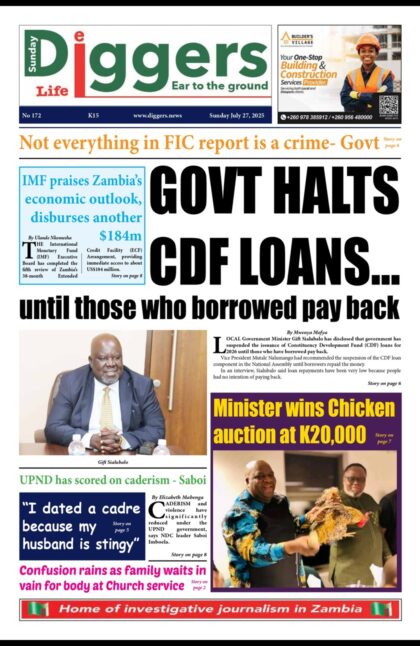Cabinet has cancelled some signed, but undisbursed loans, to moderate Zambia’s growing risk of debt distress, says Finance Minister Margaret Mwanakatwe.
Addressing journalists at a press briefing in Lusaka, Tuesday, Mwanakatwe said Cabinet had resolved to cancel some signed, but undisbursed loans in order to moderate Zambia’s mounting risk of debt distress.
She equally announced that Cabinet directed that no Ministry, province or spending agency should contract goods and services without availability of funds despite it being budgeted for.
This follows a surge in Zambia’s external debt portfolio reaching record-breaking levels of over US $10.1 billion, while domestic arrears owed to suppliers and contractors had continued piling up to K15.6 billion.
“Cabinet deliberated on the growth prospects and the need to restore GDP growth on an upward trajectory in 2019 and over the medium-term. Cabinet took recognition of the domestic and external factors that have negatively impacted on growth. On the domestic front, Cabinet noted the negative impact of climate change that has affected agriculture and electricity production and the tight liquidity conditions. On the external front, the impact of the trade war (between USA and China) and uncertainty around Brexit were noted,” Mwanakatwe said.
“As a response to these developments, Cabinet undertook to: implement fiscal reforms by slowing down the level of the deficit to ensure that liquidity conditions improve and spur growth; urgently complete energy reforms and renegotiate unsustainable power purchase agreements so that the sector does not become a contingent liability on the fiscus and to ensure continued investments in the sector to overcome the energy deficit over the medium-term; address liquidity challenges by dismantling domestic arrears and halting the accumulation of new arrears; and, designate the Ministry of Development Planning as a focal point lead in the implementation of the diversification agenda for better accountability.”
She said the approved measures included the cancellation of signed loans.
“Cabinet directed that legal reforms, such as the enactment of a new Public Procurement law, should be hastened to ensure value for money and that Ministries should improve on contract management; and Cabinet also directed that no Ministry, Province, or Spending Agency should contract goods and services without availability of funds even if it is budgeted for to stop the accumulation of arrears. To this effect, the Treasury was directed to issue strict guidelines on the matter. The Treasury was also directed to ensure that the measures above are implemented expeditiously to facilitate the sourcing of external funds to finance critical expenditures in the 2019 budget that are required to support growth,” Mwanakatwe said.
“[Cabinet] reaffirmed to indefinitely postpone the contraction of all new non-concessional loans in the intervening period; to cancel some signed, but undisbursed loans; increase the control and management of disbursements on foreign financed loans; and reduce the deficit to induce lending to the private sector. To this effect, the Minister of Finance was directed to Cabinet a list of loans to be considered for cancellation, postponement and slowdown for consideration.”
She also disclosed that Zambia’s external debt currently stood at US $10.18 billion from US $10.05 billion by the end of last year.
“Our debt is US $10.18 billion, which is all external debt. What we have paid vis-à-vis debt service is more than US $520 million. If you look at how the (international gross) reserves have moved from December [2018], which was about US $1.56 billion to about February [2019], which was about US $1.46 billion, they have reduced by about a US $120 million. So, you can see that we, as a government, are able to find in the market, when we need to pay debt service, we don’t just go into the reserves and say: ‘let’s pay,’ no! Secondly, we’ve said let’s start reserving in gold. The central bank is working around that to ensure that we can buy the gold locally and be able to boost the reserves,” Mwanakatwe said.
She said Cabinet further directed the Finance Ministry to present a list of project loans to be considered for slowing down, postponement or cancellation.
“Cabinet agreed that the fiscal deficit needs to be reduced to sustainable levels. Cabinet also noted the impact of the increase in debt service payments on the budget and the need to reduce this expenditure, the build-up of domestic arrears and the tightening of liquidity on the domestic market. In order to address these issues, Cabinet directed that: the Minister of Finance to present to Cabinet at its next sitting a list of project loans to be considered for slowing down, postponing and cancellation. In doing so, projects that are of an economic nature will not be cancelled as resumption of growth is important to address the current challenges. However, management of disbursements on these loans will be important,” said Mwanakatwe, who also urged Ministers to increase communication and provision of information to the public to provide facts that would facilitate decision-making in the economy.
Meanwhile, Deputy Secretary to the Cabinet Christopher Mvunga appealed to the business community to stop quoting their prices in US dollars, reminding stakeholders that Zambia’s legal tender was kwacha.


















